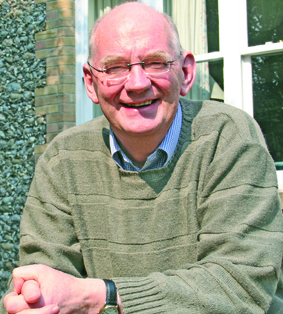Bishop returns to House of Lords
BISHOP Kenneth returned to the House of Lords - to praise an Isle of Wight initiative and warn the government about budget cuts in Portsmouth.

Bishop Kenneth
The bishop made his first Parliamentary speech since undergoing a second bone marrow transplant over the summer to combat leukaemia. His contribution was due to be heard as part of the debate on the Queen’s speech.
And he praised an initiative by the Isle of Wight Council to turn the island into the first ‘eco-island’ in Europe. The local authority wants to make the island carbon neutral within the decade.
Bishop Kenneth said: “This would involve using more renewable energy, such as tidal and wind power, recycling waste, including from 5,500 cows, in order to run buses, with cyclists and horses given equal space to motorists. They are involving Sir Terry Farrell, who has developed the world’s largest eco-city in China.
“They have a lot going for them in this exciting opportunity. More than half the island is designated an area of outstanding natural beauty, and the coastline is nearly all protected, and its waters are clean. The chief executive of the council has high hopes for the creation of wealth, and the island becoming a major exporter of green energy from tidal power alone.
“In that regard, the new Energy Bill needs to be far more robust, as this kind of project will need careful nurturing, and it is important that it does not in any way fall between central and local government resourcing and planning, particularly as the South appears to have received what I’m told is the worst settlement from government in 20 years.”
The bishop also planned to speak about Portsmouth, highlighting the £18m that is due to be cut from the city council’s budget.
He said: “In order to pay for each new programme or initiative, the government is reducing the funding to local authorities, who then have less and less money to spend on their core work. As the greater part of this money goes on social care of adults and children, they are always the worst affected.
“We seem to be approaching the point where some local councils can only afford to do the statutory minimum, and there’s no slack either to look after others who are very hard pressed, but not in crisis, or to devote resources to vital prevention services.
“I need hardly say that this will put yet further pressure on the voluntary sector, where the churches and faith communities are prominently industrious, and have been so for a long time.
“There is an unfortunate perception that the local scene is awash with central government initiatives that never get properly evaluated and are not funded as ongoing concerns after the pilot period ends, which is why we shall be watching many of the developments signalled in the Gracious Speech with interest. The new emerging concordat between central and local needs to take some of these concerns very seriously indeed.
“One example of such initiatives is the Local Strategic Partnership, which in Portsmouth had a consultation with the local community, including young people, who quickly articulated the need to improve education attainment, and the need for affordable and accessible transport, which is becoming a chronic problem across the area.
“The promised freedoms to local authorities over transport lead some of us to think that it might be possible to resurrect the LRT (Light Rapid Transit) scheme, involving both Gosport and Portsmouth. Toll roads and congestion charges are unlikely to do the trick on their own.”
The bishop was given his second bone marrow transplant in July, and is gradually easing his way back to work. He attended a cathedral service to mark the 10th anniversary of the links between Portsmouth and Stockholm dioceses in October, and has several confirmation services in November in his diary.